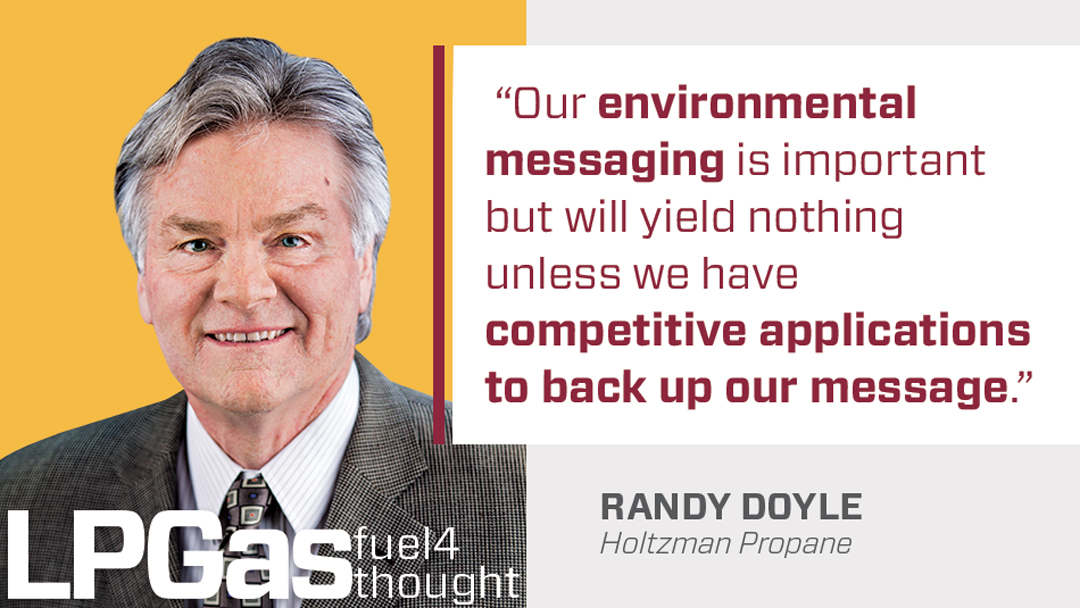Hydroheat: Propane’s best response to electrification
The deck is stacked against our small industry.
Recent evidence of huge government incentives to electrify is contained in the recent Inflation Reduction Act. The proliferation of electric heat pumps is inevitable. Misleading messaging at every turn says gas is bad and electricity is good and, therefore, our future because it’s “renewable” and “zero carbon.”
The good news is these mythical claims about electrification will fall apart with time. The electrification technology does not exist today to support the goal to eliminate fossil fuels.
Therefore, the industry should proceed with confidence we aren’t going away. But we must secure our place in the energy conversation. Our environmental messaging is important but will yield nothing unless we have competitive applications to back up our message.
Our priority to innovate applications must be in propane’s best market – the homeowner. The residential market has been and will likely always be the industry’s bread and butter.
Rinnai, the Propane Education & Research Council, Bindus Manufacturing and propane marketers have been collaborating to deliver the industry’s best response to electrification. The application is called the Heat Pump Helper (HPH). It can serve as the heat pump’s backup or primary space heat on straight cooling systems.
HPHs are not new. Hydroheat has been around for decades. The oil heat industry successfully promoted oil boilers as the heat pump’s backup in the 1990s.
The HPH project team’s objective is to deliver a solution that integrates its parts (tankless water heater, hydronic coil, air handler), while simplifying the installation, thereby reducing cost and errors. The retrofit kit enables all-electric heat pumps to be upgraded to dual fuel systems quickly and easily. Without adding another burner tip, radiator-quality heat will be provided through the home’s forced air system using propane-heated water.
How the homeowner benefits
With the HPH, the homeowner will experience:
- Improved comfort: Delivering warmth to the homeowner on a cold winter’s day is propane’s greatest moment. Hydroheat is a superior heating source versus electricity, which scorches the air and removes its moisture. Skin and sinus problems are common ailments from the dry air. Further, hydroheat generates 100-plus-degree-F air from the register versus the 85-degree-F air from the heat pump.
- Lower energy cost: The cost to operate the heat pump’s electric heat strip is at least double that of propane hydroheat in most markets. A typical all-electric Michigan homeowner will pay $750 per year more than if using the HPH as the alternate heat source.
How the propane industry benefits
- Leverages our strongest and most enduring customer base, the residential market, into more gallons sold.
- Helps policymakers and utilities save the nation’s failing power grid. HPH will move energy demand during peak periods from the grid to propane.
- Leverages the propane industry’s best technology for the home – the tankless water heater. HPH “sweetens the pot” for the homeowner to invest in a tankless water heater.
- When combined with propane whole-house generators, comfort and security are ensured if power goes out.
Commercialization
The propane marketer must be engaged in its commercialization. Specifically, the propane marketer should:
- Use the HPH in their home.
- Have their technicians and installers learn the product.
- Tell your HVAC and plumbing contractor partner about the HPH. The trades are essential to our success.
- Target your all-electric residential customer, especially those with a tankless water heater, for the HPH solution.
Stay tuned with the HPH project team’s work. When the application is ready for market, we should remember the adage: “When everything is priority, nothing is priority.” HPH is our best response to electrification. It will deserve our industry’s priority and full engagement when we commercialize.
For more information, go to heatpumphelper.info.
Randy Doyle is a 40-year industry veteran who serves on the NPGA board of directors and is active in the Virginia Propane Gas Association. He is a past PERC councilor. He consults with Holtzman Propane in Mt. Jackson, Virginia.

















